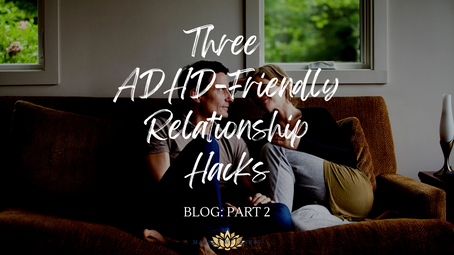This is a continuation of the previous blog:
“Three Ways ADHD Can Impact Your Relationship”
In that article, we talked about some of the challenges you and your partner might have to deal with if they have ADHD. This follow-up blog offers some solutions to those challenges. Everyone’s different, so you will have to test these out to see if they work for you. But this will give you a place to start building your ADHD toolbox, so your relationship stays strong.

Hack 1. Managing chaos in the house
Chaos is often inevitable when living with people with ADHD, but you both need to feel comfortable in the home. So it’s important that you sit down together to figure out your needs. If you can figure out who would rather do laundry all day than wash toilets, you’re halfway to a solution.
After you’ve done that, here are some strategies that might help:
Create visual reminders
Chore charts aren’t just for kids; they can be helpful tools to let both of you know what chores need doing and whose job they are. You can also make liberal use of post-its. Just make sure these don’t get passive-aggressive. There’s no shame allowed in the toolbox.
Create zones of acceptable chaos
‘Out of sight, out of mind’ is a big struggle for people with ADHD. If that package isn’t visible on your partner’s path out the door, it’s never getting sent. Where possible, let them set up systems that work, rather than trying to force something just because it’s conventional. And give them a place to be messy without consequences. Sometimes they might just need a spot to externally process their internal chaos.
Hack 2. Feeling heard and prioritized by your partner
ADHD creates different communication styles, difficulty focusing, and a lot of distractibility. It’s easy to feel like you’re being ignored and not given priority, when a lot of it is just connected to the way your partner’s brain works. Start by reading ADHD writers who can explain things like hyper focus (when the brain latches onto one thing and it becomes almost as powerful as an addiction), and executive functioning challenges like task-switching and prioritization. This will help you see your partner’s perspective and may provide some extra guides for communication.
Here are some strategies to help:
Learn how they listen
What might look like not-listening to you might be the way your partner listens best. Painting while you two talk might keep them from zoning out. If they listen better while multitasking, then let it happen. You can call them on it if they are missing information you give them but otherwise it’s good to be flexible. If you need a talk with all their focus, suggest doing it while you’re on a walk together to incorporate some background stimulation.

Help them refocus
It might take a minute for your partner to redirect their attention if they’re focusing on something else, and in that time, they might have missed half of what you said. Think of it like calling someone and talking before they’ve picked up. They’re not ignoring you; their brain’s just not on your frequency yet. Try getting their attention first, by saying their name or standing in their eye-line, and waiting for them to acknowledge you, before you start talking. This will give them time to transition.
Pick your Moment
You deserve to be heard and given attention. But there will be times when your partner just can’t. Maybe they’re really preoccupied, or they’re burned out and know they’re not processing well. Sometimes it’s not a matter of not wanting to listen, but not being able. If the information isn’t time-sensitive, try waiting for a better time. You will be respecting their needs and letting them pick a time when they’re able to truly be there for you the way they want to be.
Bonus tip
If you tell a story, and your partner responds with a story about their own experience, they are not trying to hijack your story. Many neurodivergent people use their own experiences as ways to connect and relate to others. Don’t assume it’s being done out of disinterest.
Hack 3. Support your partner to make criticism less painful
I don’t know if you’ve sensed a theme yet; talking is at the core of all these strategies. Talk to your partner about your concerns while everyone’s relaxed and calm. Rational, productive conversations don’t happen when people are keyed up. You don’t learn how to drive during a tornado.
Find out if there’s something specific triggering their rejection sensitivity
If they had a critical parent who couldn’t be satisfied, or a teacher who liked to embarrass them, and your criticism/feedback style is mirroring that person, it could create extra emotional discomfort.
Don’t throw water on a grease fire
Try not to give non-urgent feedback at intense moments. If your partner’s running around the house trying to find their keys because they’re late for work, don’t pick this time to tell them that you hate how they never put their keys in the key bowl. Help them find their keys and talk later about how to make the key bowl more effective. If the two of you are arguing, and you have some feedback that will totally fix one of your problems, it might be good feedback but it’s not good timing. When people, not just people with ADHD, are triggered, we get stuck in the brain stem. Lots of emotional things happen here, but the upper cortex, which is the rational part of the brain, doesn’t get to drive the bus. So have tough talks when you are both feeling regulated. They’ll have an easier time receiving criticism and you’ll have an easier time giving it constructively. And the same goes if you’re the one taking the criticism.
Just let it go
Are you giving feedback to make a positive change? Or are you annoyed and disguising arguments as feedback. Learn the distinction and think about what you actually need to work on with your partner and what things life’s too short to worry about.
And if it is necessary feedback, just accept that sometimes it won’t go that well. You can do everything with compassion and good timing, and your partner still might get upset. In these moments, just be there for them. They likely know their reaction doesn’t make sense, and they might be really upset about being so upset. Just be a good partner and be with them through the emotions.

The big take-away here is to be patient and loving with each other. Talk things through. Encourage your partner to get some kind of support, whether that’s a peer group or therapy. If they’re open to it, explore medications with a qualified professional.
Both of you must be accountable. Prioritize learning about what your partner’s going through. Listen to their experiences and do research on your own from other ADHD writers, youtubers, etc. You probably experience some things differently than your partner, and it’s important you try to understand and not invalidate what they’re going through.
Your partner needs to stay accountable too. If there’s a behavior causing problems, they need to do their part in working on it. Some things might just be a part of who they are, but if those things are harming the relationship, they should be taking responsibility for working on what they can. Figure out what reasonable expectations are for each other and proceed from there.
And finally, just be patient with each other: You’re both going to screw up. It’s going to happen. It happens to literally every couple. Have the fight, make the mistake, and then learn from it and grow together. Relationships, like life, are a non-linear process, and they grow in all kinds of unexpected directions. Just hang on, roll with it, and enjoy the journey.
Start Therapy for Mental Health in St. Louis
If you live in St. Louis and are ready to improve your mental health, we are here to help.
Contact Us!
Additional Counseling Services at Marble Wellness in St. Louis, MO and Chicago, IL
Counseling services designed to help set you on a path of living a more fulfilled, calm, and happy life.
St. Louis
Our St. Louis team of therapists have a variety of training backgrounds and areas of expertise. We specialize in anxiety, depression, grief, chronic illness, therapy for men, couples, and maternal overwhelm. We can also help new moms with various postpartum concerns, moms in the thick of parenting, and moms with teens. We can also chat from wherever you are in the state with online therapy in Missouri and online therapy in Illinois. No matter where you are in your journey, we would love to support you.
Chicago
Our Chicago team of therapists offer a wide range of mental health services to help our clients through the different challenges and hurdles in their life. In addition to anxiety, depression, grief, therapy for men, and maternal overwhelm, we are specialized in professional burnout, therapy for breakups, and love partnering with working moms.




